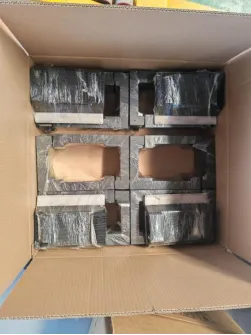Flexible Solutions for Electrical Cable Management and Support Systems
Understanding Electrical Cable Carriers Importance and Applications
Electrical cable carriers, also known as cable drag chains or cable tracks, are essential components in many industries, providing a reliable means to manage and protect electrical cables and hoses. These systems support moving electrical and data lines, ensuring they remain organized and are free from wear and tear during operation. The significance of electrical cable carriers cannot be overstated, as they enhance operational efficiency, safety, and longevity of wiring systems.
What are Electrical Cable Carriers?
Electrical cable carriers are designed as flexible chains that hold and guide cables and hoses along a predetermined path. They are typically made from durable materials such as plastic or metal, which allow them to withstand the stresses and strains of continuous motion. The design of these carriers allows for a degree of flexibility, enabling them to bend and flex as machinery moves, thereby preventing tangling or damage to the cables they contain.
These carriers come in various sizes and shapes, depending on their intended application. Common types include single and double-channel designs, as well as models with various internal structures to accommodate different cable types, including power, data, and hydraulic lines.
Importance of Electrical Cable Carriers
1. Protection of Cables and Hoses One of the primary purposes of cable carriers is to protect electrical cables and hoses from mechanical stress, abrasion, and environmental factors. In environments where equipment is in motion, such as manufacturing plants, mines, and crane operations, the risk of cables getting pinched, crushed, or frayed is high. Cable carriers mitigate these risks effectively.
2. Improving Efficiency By organizing cables and hoses neatly, cable carriers improve operational efficiency. They prevent tangling and clutter, making it easier for maintenance personnel to perform inspections and repairs. Moreover, a well-organized cable management system enables quicker troubleshooting and minimizes downtime during operations.
electrical cable carrier

3. Safety Enhancement Unmanaged cables can pose significant safety hazards, including trip hazards and the risk of damage to both employees and equipment. Cable carriers help to declutter workspaces, reducing the likelihood of accidents caused by loose cables. Additionally, protecting cables from damage prevents electrical shorts or failures that could lead to dangerous situations.
4. Versatility and Adaptability Electrical cable carriers are highly versatile and can be used in various applications, including robotics, CNC machines, conveyors, and more. Their adaptability to different environments and ability to accommodate multiple cable types make them integral in diverse industries such as automotive manufacturing, aerospace, and construction.
5. Longevity of Equipment By protecting cables and hoses from wear, electrical cable carriers extend the lifespan of these components. This not only reduces the costs associated with regular replacements but also enhances the overall durability of the machinery involved.
Applications of Electrical Cable Carriers
Electrical cable carriers are ubiquitous in industrial settings. In manufacturing, they facilitate the smooth operation of robotic arms and automated machinery, ensuring that power and data lines remain secure during cycles of movement. In the marine industry, they protect cables on boats and ships, where exposure to saltwater and motion can be particularly damaging.
In construction, cable carriers are employed in cranes and heavy machinery, where they help maintain efficient workflow without the risk of damaging airborne cables. In entertainment, such as in stage production, cable carriers manage lighting and sound equipment cables, ensuring a neat and safe workspace.
Conclusion
In conclusion, electrical cable carriers play a crucial role in maintaining the functionality, safety, and efficiency of modern machinery and equipment. By protecting cables and hoses from damage, preventing clutter, and enhancing workplace safety, they are an invaluable component across various industries. As technology advances, the designs and materials for these carriers will likely continue to evolve, allowing for even greater performance and adaptability in the face of emerging challenges. Investing in high-quality cable carriers is a proactive approach to ensuring the longevity and reliability of electrical systems, ultimately leading to improved productivity and safety in the workplace.








